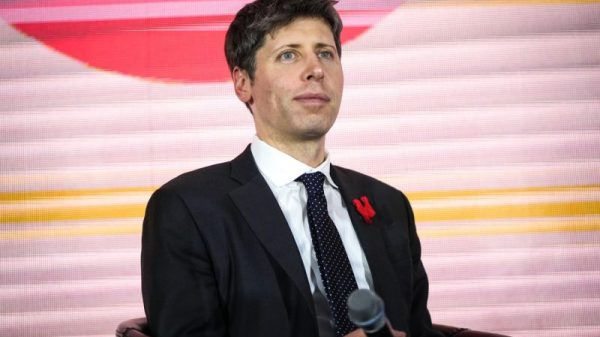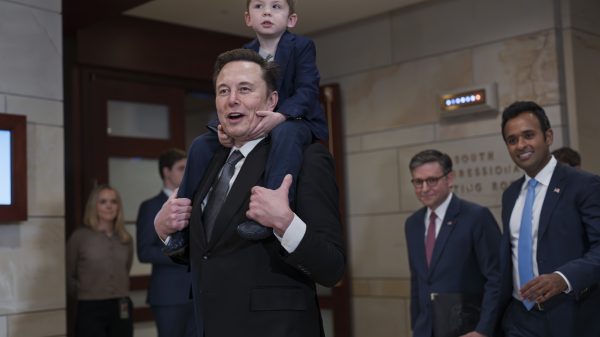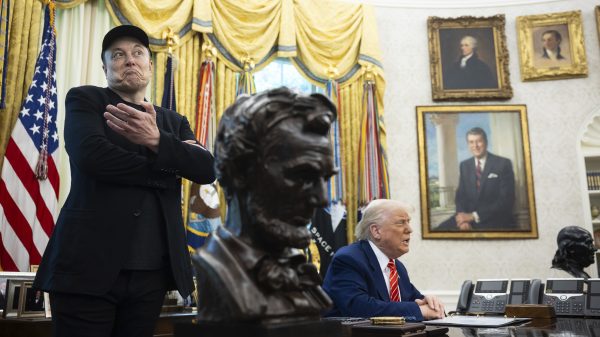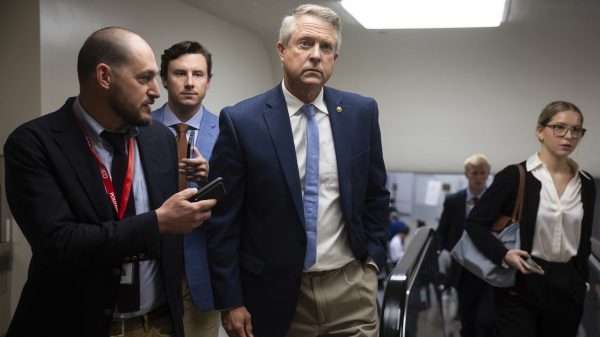John Thune is wasting no time moving President Donald Trump’s “big, beautiful bill” through the Senate.
The Senate majority leader laid out a rat-a-tat tempo for the coming weeks in an exclusive interview with POLITICO that he hopes will culminate in final passage of the party-line megabill by Republicans’ July 4 deadline.
Senate committees will fully release revised text of the bill by the end of next week, Thune said. Panel markups where that text might be debated and potentially amended will be highly optional. And he is already in close consultation with Trump about targeting key senators who will need to be persuaded to back the sprawling legislation.
“He’s been very engaged,” the South Dakota Republican said. “I think he would do that whether we asked [or not], but we tried to give him some direction, yeah.”
Thune laid out the detailed timeline after POLITICO first reported Monday that some Senate panels will start releasing their tweaks this week — starting with the Armed Services Committee Tuesday night.
Next week, panels writing the trickiest and most substantial parts — including the Senate Finance Committee — will release text. Trump will meet with other Republican members of the tax-writing panel at the White House Wednesday and “lay out kind of what he wants to see,” Thune said.
Now five months into his longtime dream job, Thune is tasked with shepherding his party’s biggest legislative priority to fruition with little margin for error. Republicans need to figure out how to corral nearly all their members while bridging internal divides on thorny issues such as the size of spending cuts, the future of social safety net programs and the architecture of major tax policies.
“It’s striking the right balance,” Thune said. “Without getting into the particulars, there are a ton of tradeoffs you have to make.”
He compared trying to lock down the bill to playing a game of Whac-A-Mole but added that he believes he has “a handle on what the dials are and how they can be turned and what the various options are to try to get to 51.”
Thune has at least one guaranteed “no” vote in Sen. Rand Paul, with the Kentucky Republican vowing to oppose the bill as long as an increase in the debt ceiling is included. Thune noted that he’s spoken extensively with Sen. Ron Johnson, a deficit hawk whom leadership views as their second-most-likely opponent. Meeting the Wisconsin Republican’s public demands of trillions of dollars in additional spending cuts will be a tall order, Thune acknowledged.
“I never give up,” Thune said, and leaders are “doing everything we can to move the bill in a direction that he would be more predisposed to be for. But, you know, he’s made some fairly strong statements out there.”
“At the end of the day, everybody’s going to have to make a decision about whether or not this is better than the status quo, and, do I really want to take this down?” he added.
Trump has already started calling some senators who will be Thune’s toughest votes to lock down, with Thune calling him “the closer.” It’s not just conservative hard-liners who need attention: Sen. Susan Collins (R-Maine) told reporters on Tuesday that she has spoken with administration officials about her concerns about the potential impact on rural hospitals. Trump also called Sen. Josh Hawley (R-Mo.), who has raised concern about the House’s changes to Medicaid. Thune and Hawley have met to discuss his position.
Thune is also trying to coordinate with Speaker Mike Johnson, who has urged the Senate to make as few changes as possible to the House bill. But Thune said that was an unrealistic expectation — particularly on the state-and-local-tax deduction, an especially tough issue in the House.
“It would be very, very hard to get the Senate to vote for what the House did” on SALT, Thune said. “We’ve just got some people that feel really strongly on this.”
Other areas that could see changes include SNAP, the nutrition program formerly known as food stamps. Thune acknowledged “a concern among some of our members” about the House’s plan to require states to carry some of the program’s cost.
Thune met with Agriculture Committee Chair John Boozman (R-Ark.) Tuesday, and leadership has given the panel a list of potential savings options that would not require shifting costs to the states.
The process of tweaking the bill will largely happen behind closed doors in the coming weeks. Thune said it will be up to each Senate committee to decide whether to hold votes on their piece of the bill. While he said he believes some will, no panel has yet announced it will do so.
After the Finance panel — which has jurisdiction over both the tax and Medicare provisions — releases its text sometime next week, Senate Republicans will “fine tune” the bill, Thune said, during the third week of the month to ensure it can get 51 votes — possibly including a tie-breaker from Vice President JD Vance.
“Probably in the last two weeks of [June], we really start homing in on, you know, getting ready to get it to the floor the last week,” he said.






















